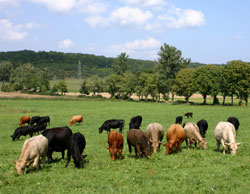Genomic databases for bluetongue virus
Bluetongue virus (BTV) is a devastating disease of ruminants. Historically, there have been sporadic incursions into the most southern regions of Europe. However, since 1998 strains of bluetongue have spread north and across Europe. Its vector, the midge, Culicoides spp has also increased its range and recently there have been reported cases in the United Kingdom. Consequently, this has made the research work of the EC funded BLUETONGUE VACCINATION project of prime importance to the agricultural world. Project partners have endeavoured to develop a safe efficacious vaccination strategy to help to stem the spread of the disease. As part of the thrust to achieve control of the virus, researchers at the Institute for Animal Health in Surrey have established a database of BTV isolates obtained worldwide. Furthermore, using sequence comparisons for all BTV isolates, primers have been developed to distinguish between genome segments from live attenuated vaccines and European field strains. These are listed at www.iah.bbsrc.ac.uk/dsRNA_virus_proteins/ReoID/rt-pcr-primers.htm. For information on the possible geographic origins of the European BTV strains, access is through www.iah.bbsrc.ac.uk/dsRNA_virus_proteins/orbivirus-phylogenetic-trees.htm. These databases will enable epidemiological studies of BTV strains. They will also enable sourcing of European infections and early detection of vaccine breakdown. This in turn will aid speedy and effective control of future outbreaks. The service is available as a free international resource.







